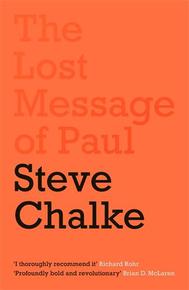
In his intriguing new book, Steve Chalke tries to rescue Paul’s original message.
His aim is to show that an important part of Paul’s message has been wrongly understood since the Reformation. It came about when Luther and Calvin misunderstood some crucial phrases.
From the outset, he readily admits that his ideas are drawn from works of scholarship, especially from a group of New Testament specialists sometimes called The New Perspective on Paul. But he doesn’t just lift ideas from elsewhere – this remains his own book with his own sometimes controversial conclusions.
"The faithfulness of Christ"
Much hinges on just a few words and phrases, but the effect of these is major. Some of the effects can be seen in different versions of the Bible. Variants of one phrase occur repeatedly in Paul’s letters: in Greek it is pistis christou. Wycliffe and Tyndale’s translations of the phrase match that of the King James Version: “the faithfulness of Christ”, or something close to that. But Luther and Calvin translated the phrase as “faith in Christ.”
The difference may seem small, but the effect was huge. The Jews of the time of Paul and of Jesus believed that we were saved not by our own actions but by God’s grace alone. Paul shared this belief, and (Steve Chalke suggests) never wavered from it. Luther claimed to do so, too. But having translated the phrase as “faith in Christ”, Luther believed that we were saved not by Christ’s faithfulness, but by our own faith: sola fide.
Yet if we are saved by our own faith alone, it cannot also be by God’s grace alone. It just doesn’t make sense. Paul, says Chalke, is clear that we are saved by God’s grace.
Following eminent scholars such as Tom Wright, James Dunn and EP Sanders, he explains in detail some of Paul’s familiar terms as he says they were always intended: The law; works; flesh.
According to Chalke, when Paul says you are not saved by works, he is not talking about good deeds, but about the work of food preparation, washing and other observances of Jewish law. In other words, you cannot be saved by being an observant Jew. Because of the faithfulness of Christ to God in his death and resurrection, Gentiles and Jews alike can be saved by God as revealed in Christ.
Heaven and hell
Chalke then looks at who it is that is saved. "Therefore just as one man’s trespass led to condemnation for all, so one man’s act of righteousness leads to justification and life for all." (Romans 5:18) Justification and life "for all". That’s what Paul writes. And that, says Chalke, is what he means.
He follows this with sections on heaven and hell, on punishment, forgiveness and justice. His message is always that Paul and the gospels consistently speak of peace, forgiveness and mercy.
He deals with what is sometimes called the “inaugurated eschatology”; the understanding that the Kingdom of heaven is not ‘up there’ and awaiting our deaths, but already with us. Heaven is not only in the future, but in the here and now. He quotes Paul in explanation, and also looks at Paul’s use of the Old Testament; how this helps to explain that the God who is sometimes thought to be cruel and merciless is in fact anything but that. Again and again, he is seen to be the God of love.
The Bible as ultimate authority
Chalke writes well, and brings in information from many different sources, but always returning to the Bible text as his authority. It is a book that will surprise some, annoy others, and teach many. Some sections are closely argued and powerfully expressed. Others seem more sketchy, or unnecessary, such as when looking at what hell is (eternal punishment or, as Chalke argues, a time of pruning), he includes a lengthy section on the pre-history of the idea of hell in different civilisations and religions.
He writes also about the effect of adverse childhood experiences, and about neural pathways in the brain and how they affect development. About how we don’t all get an even start in life. Very interesting, but surely too much and too complex to squeeze into this book, and really only indirectly relevant. It is as though he was nearing the end and suddenly realised that he hadn’t addressed some of the important social problems addressed by his admirable group of charities, called Oasis, so quickly roped them into the final section. In this book they seem like a hasty supplement. His appendix, a brief account of the ancient Greeks’ idea of the afterlife, should have been cut. A shorter book would have had more punch.
Despite these small criticisms, I can strongly recommend the book, even if you are certain you will disagree with Chalke’s conclusions. You will find in this book much that is involving, much that is challenging and much that will help you to understand Paul better. Read it, even if only to convince yourself that you can refute his case.
Simon Kingston is formerly a publisher with companies such as Faber and Routledge and is now a freelance writer and editor
The Lost Message of Paul (SPCK) is out now. Click here to read another perspective on the book
Premier Christianity is committed to publishing a variety of opinion pieces from across the UK Church. The views expressed on our blog do not necessarily represent those of the publisher





























